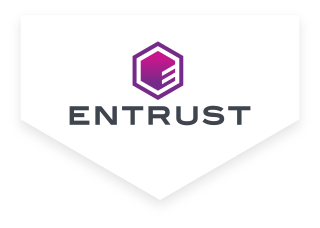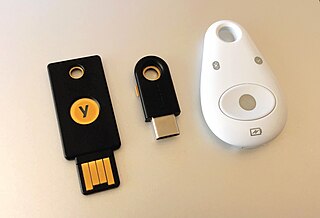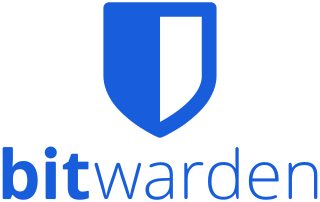Related Research Articles

Authentication is the act of proving an assertion, such as the identity of a computer system user. In contrast with identification, the act of indicating a person or thing's identity, authentication is the process of verifying that identity. It might involve validating personal identity documents, verifying the authenticity of a website with a digital certificate, determining the age of an artifact by carbon dating, or ensuring that a product or document is not counterfeit.

A smart card (SC), chip card, or integrated circuit card, is a card used to control access to a resource. It is typically a plastic credit card-sized card with an embedded integrated circuit (IC) chip. Many smart cards include a pattern of metal contacts to electrically connect to the internal chip. Others are contactless, and some are both. Smart cards can provide personal identification, authentication, data storage, and application processing. Applications include identification, financial, public transit, computer security, schools, and healthcare. Smart cards may provide strong security authentication for single sign-on (SSO) within organizations. Numerous nations have deployed smart cards throughout their populations.

A security token is a peripheral device used to gain access to an electronically restricted resource. The token is used in addition to, or in place of, a password. Examples of security tokens include wireless key cards used to open locked doors, a banking token used as a digital authenticator for signing in to online banking, or signing transactions such as wire transfers.

Ivanti is an IT software company headquartered in South Jordan, Utah, United States. It produces software for IT Security, IT Service Management, IT Asset Management, Unified Endpoint Management, Identity Management and supply chain management. It was formed in January 2017 with the merger of LANDESK and HEAT Software, and later acquired Cherwell Software. The company became more widely known after several major security incidents related to the VPN hardware it sells.

Gemalto was an international digital security company providing software applications, secure personal devices such as smart cards and tokens, e-wallets and managed services. It was formed in June 2006 by the merger of two companies, Axalto and Gemplus International. Gemalto N.V.'s revenue in 2018 was €2.969 billion.
Electronic authentication is the process of establishing confidence in user identities electronically presented to an information system. Digital authentication, or e-authentication, may be used synonymously when referring to the authentication process that confirms or certifies a person's identity and works. When used in conjunction with an electronic signature, it can provide evidence of whether data received has been tampered with after being signed by its original sender. Electronic authentication can reduce the risk of fraud and identity theft by verifying that a person is who they say they are when performing transactions online.
Password fatigue is the feeling experienced by many people who are required to remember an excessive number of passwords as part of their daily routine, such as to log in to a computer at work, undo a bicycle lock or conduct banking from an automated teller machine. The concept is also known as password chaos, or more broadly as identity chaos.
Riverbed Technology LLC is an American information technology company. Its products consist of software and hardware focused on Unified Observability, Network Visibility, End User Experience Management, network performance monitoring, application performance management, and wide area networks (WANs), including SD-WAN and WAN optimization.

Entrust Corp., formerly Entrust Datacard, provides software and hardware used to issue financial cards, e-passport production, user authentication for those looking to access secure networks or conduct financial transactions, trust certificated for websites, mobile credentials, and connected devices. The privately-held company is based in Shakopee, Minnesota and employs more than 2,500 people globally.
AGNITIO S.L. was a voice biometrics technology company, headquartered in Madrid, Spain. Biometric authentication uses unique biological characteristics to verify an individual’s identity. It’s harder to spoof and considered more convenient for some users since they do not have to remember passwords or worry about passwords being stolen. Agnitio provides voice biometrics services for homeland security and corporate clients.

Proofpoint, Inc. is an American enterprise cybersecurity company based in Sunnyvale, California that provides software as a service and products for email security, identity threat defense, data loss prevention, electronic discovery, and email archiving.
Daon is a biometrics and identity assurance software company founded in 2000 by Irish entrepreneur Dermot Desmond. The company's name, according to Daon, derives from an "Old Irish word for human." Daon’s U.S. headquarters are in Fairfax, Virginia, with additional operations in the International Financial Services Center (IFSC) in Dublin, Ireland. The company also has regional and sales offices in Serbia and Australia.

Multi-factor authentication is an electronic authentication method in which a user is granted access to a website or application only after successfully presenting two or more pieces of evidence to an authentication mechanism. MFA protects personal data—which may include personal identification or financial assets—from being accessed by an unauthorized third party that may have been able to discover, for example, a single password.
BeyondTrust (formerly Symark) is an American company that develops, markets, and supports a family of privileged identity management / access management (PIM/PAM), privileged remote access, and vulnerability management products for UNIX, Linux, Windows and macOS operating systems.

Blue Coat Systems, Inc., was a company that provided hardware, software, and services designed for cybersecurity and network management. In 2016 it was acquired by and folded into Symantec and in 2019 as part of Symantec’s Enterprise Security business it was sold to Broadcom.
A whole new range of techniques has been developed to identify people since the 1960s from the measurement and analysis of parts of their bodies to DNA profiles. Forms of identification are used to ensure that citizens are eligible for rights to benefits and to vote without fear of impersonation while private individuals have used seals and signatures for centuries to lay claim to real and personal estate. Generally, the amount of proof of identity that is required to gain access to something is proportionate to the value of what is being sought. It is estimated that only 4% of online transactions use methods other than simple passwords. Security of systems resources generally follows a three-step process of identification, authentication and authorization. Today, a high level of trust is as critical to eCommerce transactions as it is to traditional face-to-face transactions.

The FIDOAlliance is an open industry association launched in February 2013 whose stated mission is to develop and promote authentication standards that "help reduce the world’s over-reliance on passwords". FIDO addresses the lack of interoperability among devices that use strong authentication and reduces the problems users face creating and remembering multiple usernames and passwords.

Netwrix is a Frisco, Texas–based private IT security software company that develops software to help companies identify and secure sensitive data and assist with compliance auditing. After eight acquisitions the company's team geographically expanded to Latin America, UK, Germany, France, Asia, US as well as other countries. The company's flagship products are Netwrix Auditor and Netwrix Enterprise Auditor that help information security and governance professionals manage sensitive, regulated and business-critical data.

Bitwarden is a freemium open-source password management service that is used to store sensitive information, such as website credentials, in an encrypted vault. The platform hosts multiple client applications, including a web interface, desktop applications, browser extensions, mobile apps, and a command-line interface. The platform offers a free US or European cloud-hosted service as well as the ability to self-host.
Ping Identity Corporation is an American software company established in 2002 by Andre Durand and Bryan Field-Elliot. It is headquartered in Denver with development offices in Vancouver, Tel Aviv, Austin, Boston and Edinburgh. Ping also has European operations with offices in London, Paris, and Switzerland as well as offices in Bangalore, Melbourne, and Tokyo, serving Asia-pacific. It was a publicly traded company until getting acquired by Thoma Bravo and taken private in October 2022.
References
- 1 2 Scott Tiazkun (May 15, 2009). "Sign of the Times: As the government promotes universal electronic medical records, single sign-on technology gains momentum". FedTech. Retrieved August 24, 2016.
- 1 2 "Prospectus: 5,000,000 shares Imprivata". Securities and Exchange Commission. June 24, 2014. Retrieved August 24, 2016.
- ↑ "Thoma Bravo Completes Acquisition of Imprivata". Imprivata. Archived from the original on 25 February 2017. Retrieved 25 February 2017.
- ↑ John Leyden (March 7, 2005). "Single Sign On 'in-a-box' lands in Europe: Imprivata aims to turn on resellers with appliance play". The Register. Retrieved August 24, 2016.
- ↑ Ephraim Schwartz (June 5, 2006). "InfoWorld CTO 25: David Ting: CTO and founder, Imprivata". InfoWorld. Retrieved August 24, 2016.
- ↑ Peter Stephenson, SC Magazine, “Imprivata OneSign.” February 1, 2009.
- ↑ Jondi Gumz (October 28, 2013). "Lighthouse Bank to invest $4 million on new HQ". Santa Cruz Sentinel. Retrieved August 24, 2016.
- ↑ "Imprivata Agrees to be Acquired by Thoma Bravo". Press release. July 13, 2016. Retrieved August 24, 2016.
- ↑ "Schedule 14a Proxy Statement". Securities and Exchange Commission. August 12, 2016. Retrieved August 24, 2016.
- ↑ Michele Masterson, "Imprivata Targets Verticals with Single Sign-On," Channel Web (CRN.com), August 26, 2009.
- ↑ L. Samuel Pfeifle, “Imprivata picks up IdentiPHI assets”, Security Systems News, April 9, 2009